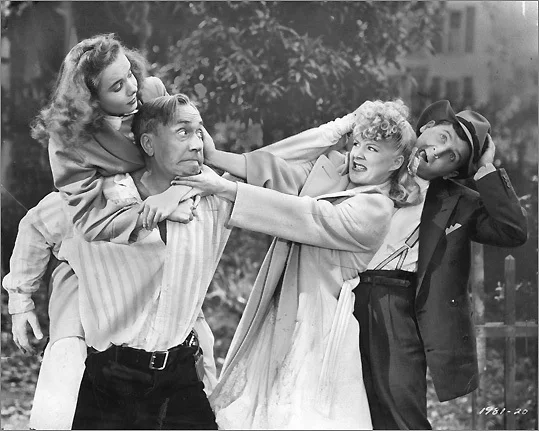
What sort of nerve must it have taken to make a film that pokes fun at patriotism, mother love, small towns, political campaigns, and the Marines in the middle of World War II? Preston Sturges's film begins in a small nightclub, where a singer (Julie Gibson) and her backup group of singing waiters launch into a stickily sentimental song, "Home to the Arms of Mother" (music and lyrics by Sturges), whereupon John F. Seitz's camera begins a traveling shot from the group and down a long bar at the end of which we see Woodrow Lafayette Pershing Truesmith (Eddie Bracken) drowning his sorrows. When a group of six Marines on leave after having fought at Guadalcanal enters the bar, Woodrow buys a round for them, and is prodded into telling them his sad story: He joined the Marines, trying to follow in the footsteps of his father, a Marine who died in World War I, but was discharged because of chronic hay fever. But instead of returning home to the arms of mother, he went to work in a shipyard and arranged for a friend to send his letters to her from overseas, disguising the fact that he was no longer a Marine. One of the men, Sgt. Heppelfinger (William Demarest), learns that Woodrow's father was his old buddy who fought with him at Belleau Wood, while another, Bugsy (Freddie Steele), is appalled that Woodrow hasn't been home to see his mother since the start of the war. So the Marines collude to take an extremely reluctant Woodrow back to his hometown and pretend that he's a war hero who has just been discharged. Naturally, the plan backfires spectacularly when the whole town joins in the celebration and even railroads Woodrow into running against the corrupt mayor (Raymond Walburn). Speed is of the essence in a farce like this, because if anyone ever gave Woodrow a moment to talk, the whole thing would collapse like a soufflé. On the other hand, too much fast talk can be wearying, so Sturges introduces a romantic subplot: Feeling that he can never return home, Woodrow has written his girlfriend, Libby (Ella Raines), that he has met someone else, so Libby has gone and got herself engaged to Forrest Noble (Bill Edwards), the son of the town's corrupt mayor. To slow the pace down, Sturges introduces a long walk-and-talk tracking scene in which Libby, confused by her revived feelings for Woodrow, tries to sort things out with Forrest, but to no avail. It's a funny, beautifully written scene, but it doesn't quite work because neither Raines nor Edwards is up to the acting demands it puts on them -- I kept thinking how much better
Joel McCrea and Claudette Colbert or
Henry Fonda and Barbara Stanwyck would have played it. Bracken, however, is wonderful, as are Demarest, Steele, Walburn, and other members of Sturges's usual crew of brilliant character actors, including Franklin Pangborn as the harried planner of the celebration and Jimmy Conlin as the town judge. This was, sadly, the last film Sturges made under his Paramount contract, which he ended because of studio interference during the making of the movie. It objected, perhaps rightly, to Ella Raines's lack of star power, but also took the film out of Sturges's hands and edited it. After a couple of disastrous previews of the studio version, however, Sturges was called back in for rewrites and some new scenes. The revised Sturges version was a hit, and earned him an Oscar nomination for best screenplay.






